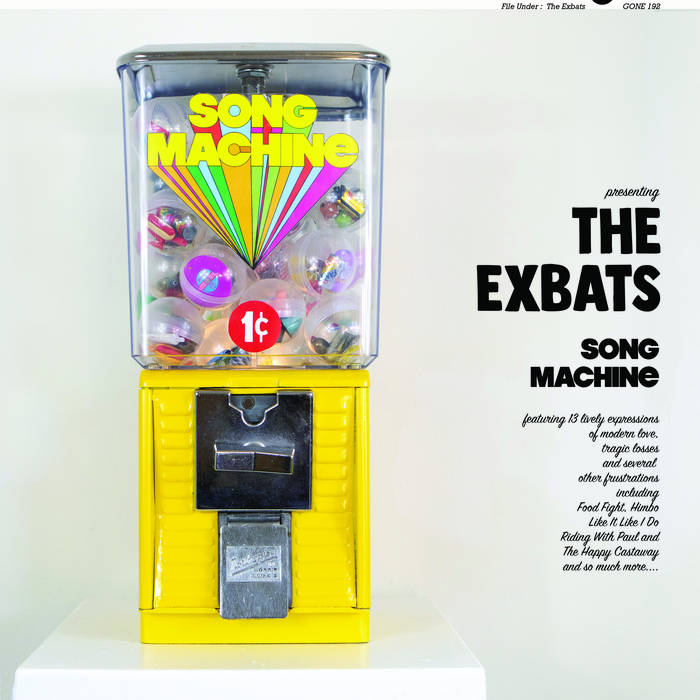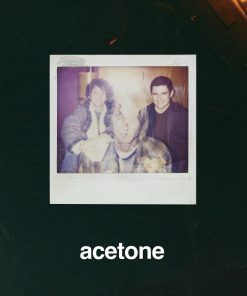The Exbats – Song Machine LP Goner Records
$ 24,98 Original price was: $ 24,98.$ 14,99Current price is: $ 14,99.
In a just world, Song Machine, the fifth full-length album from The Exbats, which arrives via Goner Records, would become one of the most-loved and most-listened to albums of the 2020s. With the thirteen-track album, the Bisbee, Arizona-based band further their analog back-to-the-future combination of the Shangri-Las and pre-Velvet Underground doo-wop wannabe Lou Reed, churning out catchy tunes laden with buoyant choruses that rank alongside the best A-sides recorded in the shadow of the Brill Building or with the Wrecking Crew in tow. The Exbats are effortless time travelers—this time, they’ve set the dial for the early 1970s, incorporating the sonic magic of The Partridge Family, Muswell Hillbillies-era Kinks, and Brian Wilson into the crux of their musical ethos, evident on tracks like the propulsive “Riding With Paul” and “The Happy Castaway,” which bookend the album.
“What I remember about that era is going to record stores and seeing a wall of 45s that somebody was tasked with moving around [in concordance with] the Billboard charts,” says Kenny McLain, who, alongside daughter Inez, is the driving force behind The Exbats. “With our band we’re kinda moving things around on that towering wall of singles, as if it were from some sort of ancient tomb, and we’re trying to crack a code and make it to number one. So, I suppose, some magic door will open. And we’ll all be free? Or something like that.”
Inez McLain, namesake of the Monkees’ wool-capped guitarist Mike Nesmith, has played drums and sung for The Exbats since she was just ten years old. Surveying the band’s back catalog in relation to Song Machine, she adds, “I always felt like our progression is similar to that of the Kinks–starting off garage and punk and then becoming more deliberate about everything.” On this latest release, time stops altogether when Inez masterfully—and wholly unselfconsciously—evokes the remarkable harmonizing of Cher or Karen Carpenter at the height of their careers on two songs that unveil the raison d’être for The Exbats, and, thus, music lovers in general: “Singalong Tonight” and “What Can A Song Do,” which, together, anchor Song Machine while poignantly and audaciously celebrating the very act of singing itself with a sentimentality worthy of Muppets Movie-era Paul Williams. In a different world, either might inspire a viral revolution.
Fast Shipping and Professional Packing
We offer a broad range of shipping options due to our long-running partnerships with UPS, FedEx and DHL. Our warehouse employees will pack all goods to our exacting requirements. Your items are carefully inspected and secured properly prior to shipping. We ship to thousands of customers every day from all over the world. This demonstrates our dedication to becoming the largest online retailer in the world. Warehouses and distribution centres can be located in Europe as well as the USA.
Note: Orders that contain more than one item will be assigned a processing date depending on the item.
We will carefully examine all items before sending. Today, the majority of orders will be shipped within 48 hours. The expected delivery time will be between 3 and 7 days.
Returns
Stock is dynamic. It's not completely managed by us, since we have multiple entities, including the factory and the storage. The actual inventory can fluctuate at any time. It is possible that the stocks could be depleted after your order has been processed.
Our policy lasts 30 days. If you haven't received the product within 30 days, we're not able to issue a refund or an exchange.
To be eligible for a refund the product must be unopened and in the same state as when you received it. The item must be returned in its original packaging.
Related products
Uncategorized
Uncategorized
Uncategorized
Uncategorized
Uncategorized
Uncategorized
Uncategorized
Uncategorized
Uncategorized
Uncategorized
Uncategorized
Uncategorized
Uncategorized
Uncategorized
Uncategorized
Uncategorized
Uncategorized
Acid Mothers Temple & The Melting Paraiso U.F.O. – Myth of the Love Electrique 2LP Riot Season (UK)
Uncategorized
Uncategorized
Uncategorized
Uncategorized


































